Unit 6 When was it invented Section A(教学课件)(共38页PPT,无素材)初中英语人教版九年级全一册
文档属性
| 名称 | Unit 6 When was it invented Section A(教学课件)(共38页PPT,无素材)初中英语人教版九年级全一册 | 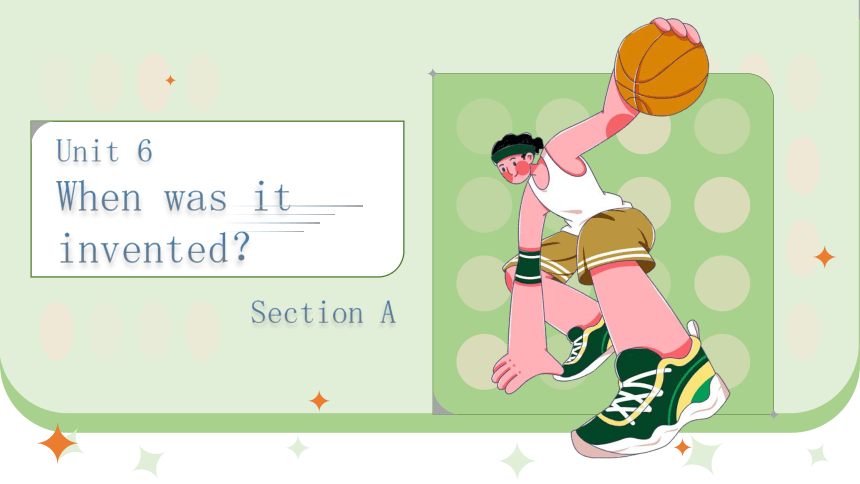 | |
| 格式 | pptx | ||
| 文件大小 | 2.0MB | ||
| 资源类型 | 教案 | ||
| 版本资源 | 人教新目标(Go for it)版 | ||
| 科目 | 英语 | ||
| 更新时间 | 2024-09-03 20:57:10 | ||
图片预览

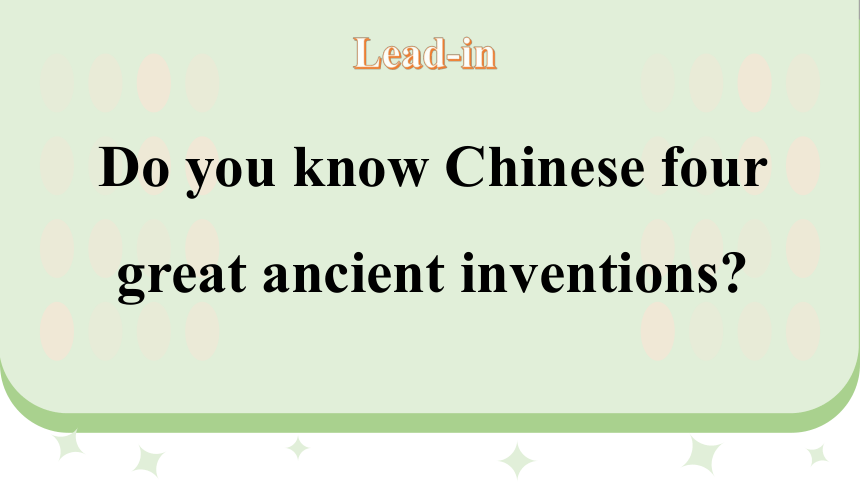
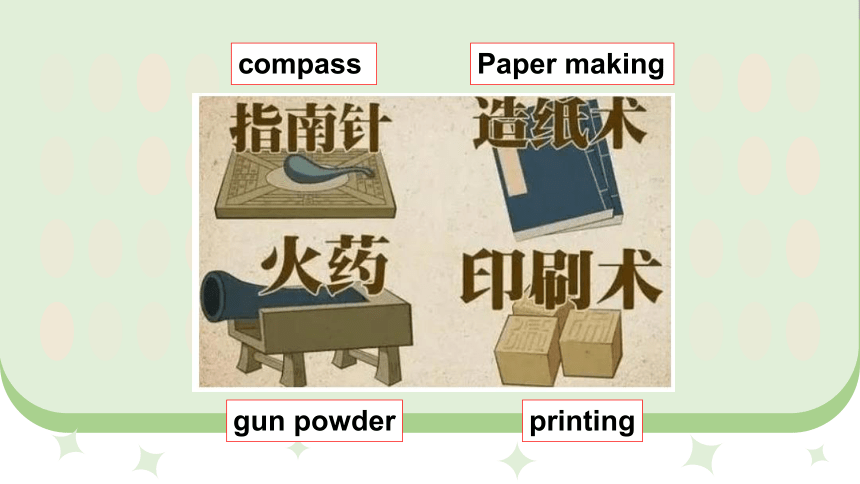
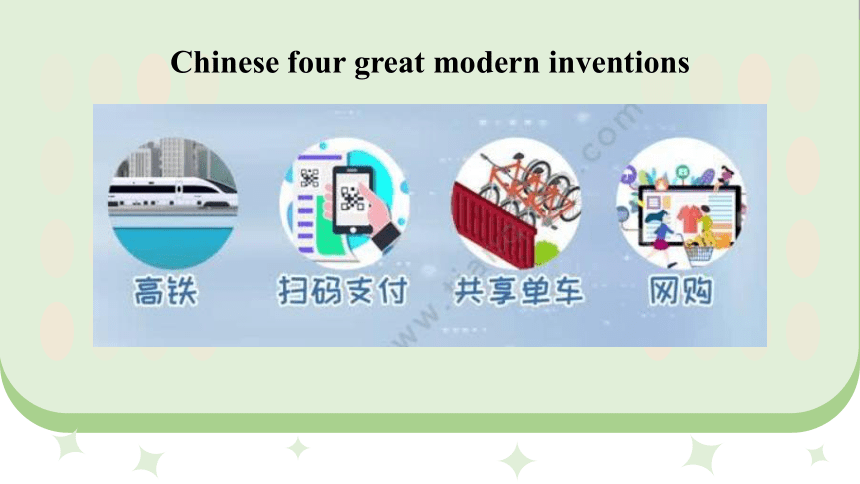
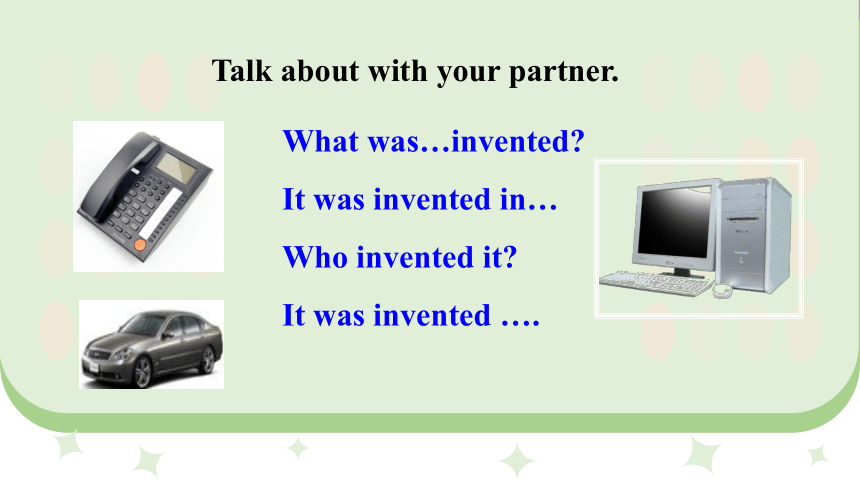
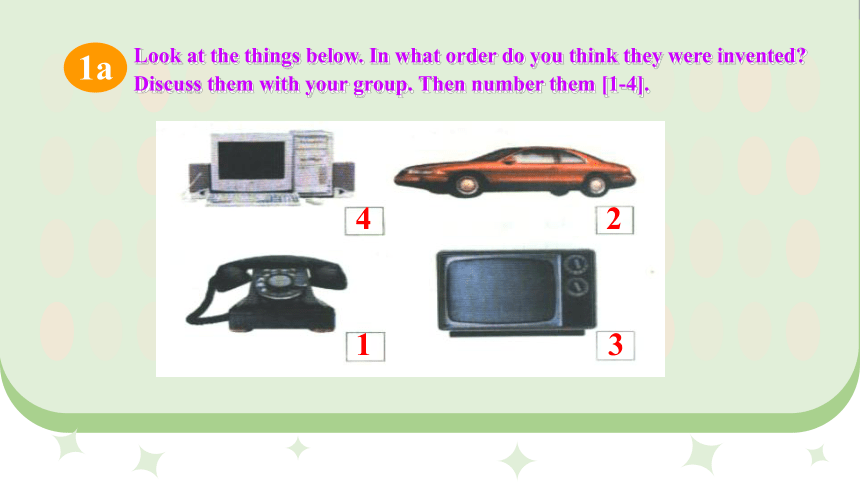
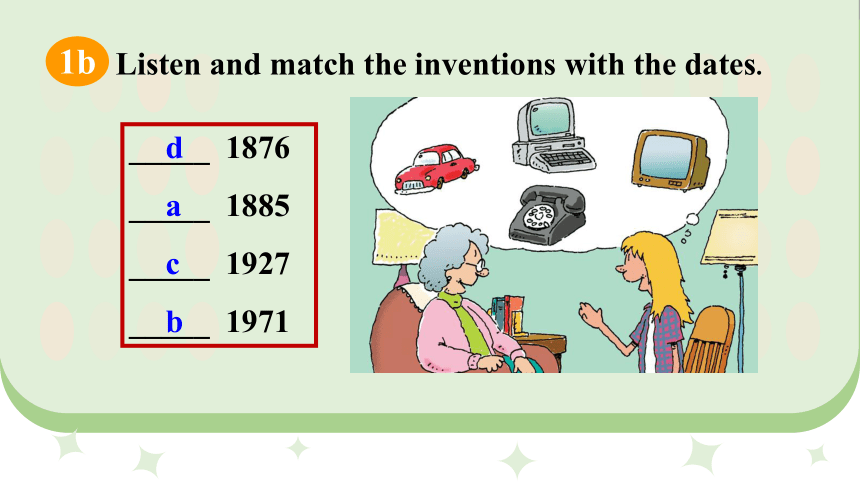

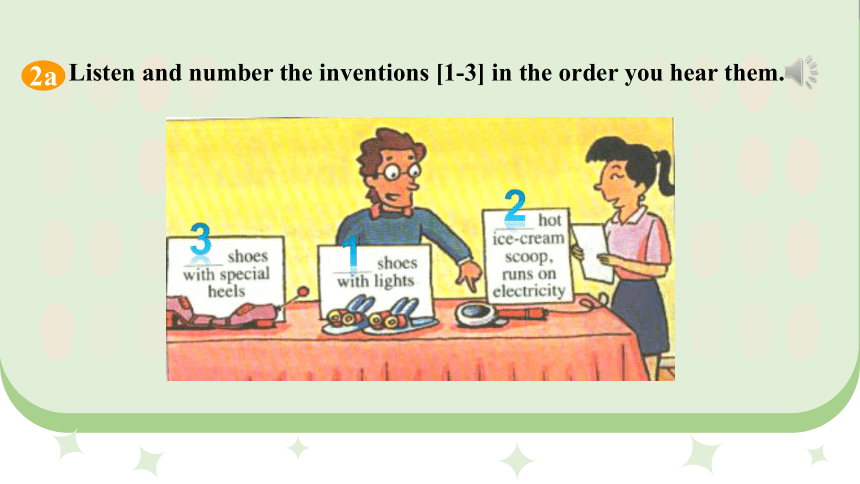

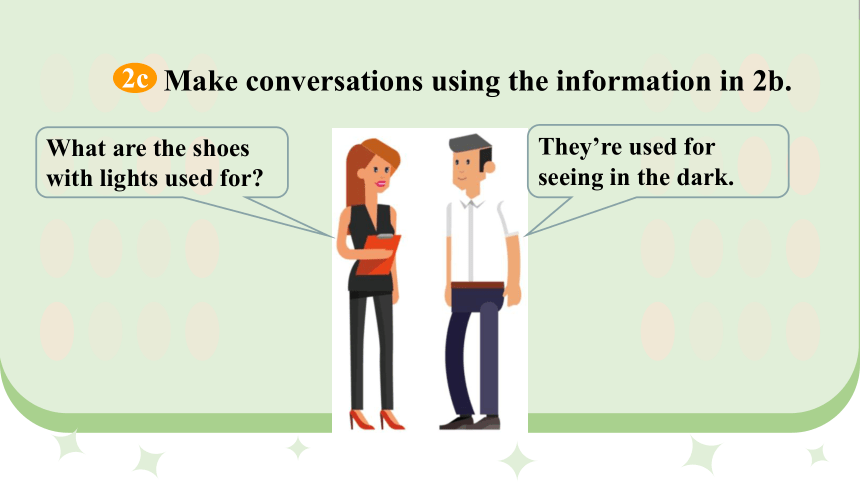

文档简介
(共37张PPT)
Unit 6
When was it invented?
Section A
Lead-in
Do you know Chinese four great ancient inventions
compass
Paper making
gun powder
printing
Chinese four great modern inventions
Talk about with your partner.
What was…invented
It was invented in…
Who invented it
It was invented ….
1a
Look at the things below. In what order do you think they were invented Discuss them with your group. Then number them [1-4].
1
2
3
4
Listen and match the inventions with the dates.
1b
_____ 1876
_____ 1885
_____ 1927
_____ 1971
d
a
c
b
Student B, cover the dates. Student A, ask Student B when the things in the picture in 1b were invented. Then change roles and practice again.
1c
When was the telephone invented
I think it was invented in 1876.
When was the car invented
It was invented in 1885.
2a Listen and number the inventions [1-3] in the order you hear them.
2a
2b
Listen again and complete the chart.
Invention What is it / are they used for
shoes with special heels ________ the style of the shoes
shoes with lights
seeing ___________
hot ice-cream scoop ________ really cold ice-cream
changing
in the dark
serving
2c
Make conversations using the information in 2b.
What are the shoes with lights used for
They’re used for seeing in the dark.
2d
Role-play the conversation.
Read the passage quickly and answer the questions.
What is the subject for their school project
2. What kind of invention does Roy think of
Small inventions that changed the world.
The zipper.
3. Why does Roy think it is a great inven-
tion
4. Who and when was the zipper invented
5. When did the zipper become popular
Because it is often used in our daily lives.
Whitcomb Judson in 1893.
Around 1917.
1. I think the TV was invented before the car. 我想电视是在汽车之前被发明的。
【解读】句中invent 作动词,意为“发明”,指发明以前从来未存在过的东西。was invented 是一般过去时的被动语态,结构为was/were + 及物动词的过去分词。
【举例】(1)Edison invented the light bulb in 1879. 爱迪生在1879年发明了电灯。
(2)The light bulb was invented by Edison in 1879. 电灯是在1879年被爱迪生发明的。
(3)Such books are written for children. 这类书是为儿童写的。
2. —Can you help me think of an invention
—With pleasure!
(1) Can you… 意为“你能……吗?”,后接动词原形。其肯定回答一般为 “Sure, I’d love/like to. /With pleasure.”,否定回答常用“Sorry, I can’t…”。
(2) With pleasure! 意为“乐意效劳!”,常用于表示接受或同意某事。
【拓展】My pleasure. 常用作对别人表示感谢时的礼貌回答。相当于“It’s my pleasure. /A pleasure.”。
3.Think about how often it’s used in our daily lives.
think about 表示“考虑,想起”
e.g.He is thinking about travelling in the summer holiday . 他正在考虑暑假旅游的事。
She was thinking about her childhood days.她正回想她的童年时期。
【拓展有关think的短语】
think of 指“考虑, 记忆, 记起”
e.g.You think of everything!你全都提到了。
think sth. over指“仔细想, 审慎思考, 作进一步考虑”
e.g.Please think over what I said.请仔细考虑我说的话。
Do you like drinking tea
3a
Read the passage quickly and match each paragraph with its main idea.
Para. 1
Para. 2
Para. 3
Lu Yu and his book Cha Jing
How tea spread to other countries
How tea was invented by accident
3b
Read the passage again and answer the questions.
1. When was tea first drunk
___________________________________
2. How was tea invented
___________________________________
3. Who is called “the saint of tea”
___________________________________
It was first drunk about 5,000 years ago.
It was invented by accident.
Lu Yu.
4. What is Cha Jing about
_______________________________________________________
_______________________________________________________
_______________________________________________________
5. When was tea brought to other countries ___________________________________________________
___________________________________________________
The book describes how tea plants were grown and used to make tea. It also discusses where the finest tea leaves were produced and what kinds of water were used.
Tea was brought to Korea and Japan during the 6th and 7th centuries. It was brought to England at around 1660.
1. It is said that a Chinese ruler called Shen Nong was the first to discover tea as a drink.
①It is said that…“据说……”
类似结构:It is believed/reported/known/supposed that...
人们认为/据报道/众所周知/据猜测......
②the +序数词+n.+ to do sth.
第几个做某事的...
2. Some leaves from a tea plant fell into the water and remained there for some time.
some time:
some times:
sometime:
sometimes:
一段时间,常与延续性V连用;对它提问用How long
几倍;几次 对它提问用How many times
某时;用于过去或将来时.提问用when
有时;表频率,对它提问用How often
3.The tea trade from China to Western countries took place in the 19th century.
take place 发生;出现。 常指事先安排或事发有因的事情。
happen 发生。常指偶然发生的事情。
一、一般过去时被动语态
由“was/were+及物动词的过去分词”构成。被动语态的时态变化只改变be的形式,过去分词部分不变。疑问式和否定式的变化也是如此
二、被动语态的用法:
1. 不知道谁是动作的执行者,或没有必要指出谁是动作的执行者。
e.g. English is spoken all over the world.
全世界都在说英语。
2. 需要突出或强调动作的承受者。
e.g. This dictionary is used by most students.
这本字典是大多数学生在用的。
三、主动语态变被动语态应注意的问题
1. 有些短语动词相当于及物动词,变为被动句时介词或副词不能去掉。
e.g. They put off the meeting because of the weather.
→ The meeting was put off because of the weather.
会议因天气的缘故被推迟了。
2. 含有双宾语的主动句变为被动句时,通常把指“人”的间接宾语变为主语,指“物”的直接宾语保留不变;如果把指“物”的直接宾语变为主语,则在间接语前加to或for。
e.g. My aunt gave me an e-dictionary yesterday.
I was given an e-dictionary yesterday.
An e-dictionary was given to me yesterday.
3. 主动句中感官动词see / hear / watch / feel等和使役动词make / let / have等后跟省略to的动词不定式,变为被动语态时应加上不定式标志to。
e.g. I saw a heavy man enter the house.
A heavy man was seen to enter the house.
4. 系动词、不及物动词或某些短语动词(happen, take place, come true, fall asleep…)没有被动语态。
e.g. What happened to Mr. Brown
布朗先生发生了什么事?
4a
Rewrite the sentences using the passive voice.
They sold the fridge at a low price.
Somebody stole my camera from my bag.
Where did you take these photos
Our parents advised us not to go out alone.
Different writers translated the book into different languages.
The fridge was sold at a low price.
My camera was stolen from my bag (by somebody).
Where were these photos taken
We were advised by our parents not to go out alone.
The book was translated into different languages by different writers.
4b
Complete the sentences with the correct forms of the verbs in the box.
eat, like, invite, tell, lock, ring, break, bring
1. You ____________ to the party last night, weren’t you Why didn’t you go
2. The earthquake happened all of a sudden, but luckily the villagers _____________ to a safe place.
were invited
were brought
3. The door ______________ when we arrived, so we ______ the bell.
4. The students ___________ not to eat or drink in class, but Ruby _________ the rule when she started eating a biscuit in science class.
5. The cookies _____________ by the hungry kids in less than 20 minutes, and they really ___________ them.
was locked
rang
were told
broke
were eaten
liked
4c
Decide whether active or passive forms should be used in these sentences. Write the correct forms in the blanks.
The telephone ______________(invent) by Alexander Graham Bell. He __________(born) in 1847.Mr.Bell __________ (work) on the invention of the telephone with Tomas Watson.In 1875,Mr.Bell ___________ (learn) how to send musical notes through an instrument similar to a telephone.Finally,the telephone __________(invent) in 1876.The first sentence ___________(say) on the telephone by Mr.Bell was "Mr.Watson,come here;I want to see you."Today the telephone _____________ (use) around the world.
was invented
was born
worked
learned
was invented
was said
is used
Vocabulary
1. invent
invention名词,意为“发明(物);创造”
inventor 名词,意为“发明者,发明家
练习:He ________ the telephone in 1876.
invented
Vocabulary
2. electricity
electric形容词,无比较等级,指“电的;电子的;带电的”
练习:Our city was without ________ last night.
electricity
Vocabulary
3. with pleasure
用于回答别人的请求,表示客气地接受或同意
my pleasure意为“别客气,不用谢”,用于回答别人的感谢
练习:-May I sit here
-Yes,___________.
with pleasure
Vocabulary
4. by accident
形容词为accidental“无意的;偶然的”。
It is no accident that...意为“......绝非偶然”
练习:I met her ________ in a crowded bus.
by accident
Vocabulary
5. remain
表示“仍然是(处于某种状态);保持不变”相当于keep。其后可接形容词、名词、分词或介词短语作表语
练习:He is in danger, but he ________ calm.
remains
Unit 6
When was it invented?
Section A
Lead-in
Do you know Chinese four great ancient inventions
compass
Paper making
gun powder
printing
Chinese four great modern inventions
Talk about with your partner.
What was…invented
It was invented in…
Who invented it
It was invented ….
1a
Look at the things below. In what order do you think they were invented Discuss them with your group. Then number them [1-4].
1
2
3
4
Listen and match the inventions with the dates.
1b
_____ 1876
_____ 1885
_____ 1927
_____ 1971
d
a
c
b
Student B, cover the dates. Student A, ask Student B when the things in the picture in 1b were invented. Then change roles and practice again.
1c
When was the telephone invented
I think it was invented in 1876.
When was the car invented
It was invented in 1885.
2a Listen and number the inventions [1-3] in the order you hear them.
2a
2b
Listen again and complete the chart.
Invention What is it / are they used for
shoes with special heels ________ the style of the shoes
shoes with lights
seeing ___________
hot ice-cream scoop ________ really cold ice-cream
changing
in the dark
serving
2c
Make conversations using the information in 2b.
What are the shoes with lights used for
They’re used for seeing in the dark.
2d
Role-play the conversation.
Read the passage quickly and answer the questions.
What is the subject for their school project
2. What kind of invention does Roy think of
Small inventions that changed the world.
The zipper.
3. Why does Roy think it is a great inven-
tion
4. Who and when was the zipper invented
5. When did the zipper become popular
Because it is often used in our daily lives.
Whitcomb Judson in 1893.
Around 1917.
1. I think the TV was invented before the car. 我想电视是在汽车之前被发明的。
【解读】句中invent 作动词,意为“发明”,指发明以前从来未存在过的东西。was invented 是一般过去时的被动语态,结构为was/were + 及物动词的过去分词。
【举例】(1)Edison invented the light bulb in 1879. 爱迪生在1879年发明了电灯。
(2)The light bulb was invented by Edison in 1879. 电灯是在1879年被爱迪生发明的。
(3)Such books are written for children. 这类书是为儿童写的。
2. —Can you help me think of an invention
—With pleasure!
(1) Can you… 意为“你能……吗?”,后接动词原形。其肯定回答一般为 “Sure, I’d love/like to. /With pleasure.”,否定回答常用“Sorry, I can’t…”。
(2) With pleasure! 意为“乐意效劳!”,常用于表示接受或同意某事。
【拓展】My pleasure. 常用作对别人表示感谢时的礼貌回答。相当于“It’s my pleasure. /A pleasure.”。
3.Think about how often it’s used in our daily lives.
think about 表示“考虑,想起”
e.g.He is thinking about travelling in the summer holiday . 他正在考虑暑假旅游的事。
She was thinking about her childhood days.她正回想她的童年时期。
【拓展有关think的短语】
think of 指“考虑, 记忆, 记起”
e.g.You think of everything!你全都提到了。
think sth. over指“仔细想, 审慎思考, 作进一步考虑”
e.g.Please think over what I said.请仔细考虑我说的话。
Do you like drinking tea
3a
Read the passage quickly and match each paragraph with its main idea.
Para. 1
Para. 2
Para. 3
Lu Yu and his book Cha Jing
How tea spread to other countries
How tea was invented by accident
3b
Read the passage again and answer the questions.
1. When was tea first drunk
___________________________________
2. How was tea invented
___________________________________
3. Who is called “the saint of tea”
___________________________________
It was first drunk about 5,000 years ago.
It was invented by accident.
Lu Yu.
4. What is Cha Jing about
_______________________________________________________
_______________________________________________________
_______________________________________________________
5. When was tea brought to other countries ___________________________________________________
___________________________________________________
The book describes how tea plants were grown and used to make tea. It also discusses where the finest tea leaves were produced and what kinds of water were used.
Tea was brought to Korea and Japan during the 6th and 7th centuries. It was brought to England at around 1660.
1. It is said that a Chinese ruler called Shen Nong was the first to discover tea as a drink.
①It is said that…“据说……”
类似结构:It is believed/reported/known/supposed that...
人们认为/据报道/众所周知/据猜测......
②the +序数词+n.+ to do sth.
第几个做某事的...
2. Some leaves from a tea plant fell into the water and remained there for some time.
some time:
some times:
sometime:
sometimes:
一段时间,常与延续性V连用;对它提问用How long
几倍;几次 对它提问用How many times
某时;用于过去或将来时.提问用when
有时;表频率,对它提问用How often
3.The tea trade from China to Western countries took place in the 19th century.
take place 发生;出现。 常指事先安排或事发有因的事情。
happen 发生。常指偶然发生的事情。
一、一般过去时被动语态
由“was/were+及物动词的过去分词”构成。被动语态的时态变化只改变be的形式,过去分词部分不变。疑问式和否定式的变化也是如此
二、被动语态的用法:
1. 不知道谁是动作的执行者,或没有必要指出谁是动作的执行者。
e.g. English is spoken all over the world.
全世界都在说英语。
2. 需要突出或强调动作的承受者。
e.g. This dictionary is used by most students.
这本字典是大多数学生在用的。
三、主动语态变被动语态应注意的问题
1. 有些短语动词相当于及物动词,变为被动句时介词或副词不能去掉。
e.g. They put off the meeting because of the weather.
→ The meeting was put off because of the weather.
会议因天气的缘故被推迟了。
2. 含有双宾语的主动句变为被动句时,通常把指“人”的间接宾语变为主语,指“物”的直接宾语保留不变;如果把指“物”的直接宾语变为主语,则在间接语前加to或for。
e.g. My aunt gave me an e-dictionary yesterday.
I was given an e-dictionary yesterday.
An e-dictionary was given to me yesterday.
3. 主动句中感官动词see / hear / watch / feel等和使役动词make / let / have等后跟省略to的动词不定式,变为被动语态时应加上不定式标志to。
e.g. I saw a heavy man enter the house.
A heavy man was seen to enter the house.
4. 系动词、不及物动词或某些短语动词(happen, take place, come true, fall asleep…)没有被动语态。
e.g. What happened to Mr. Brown
布朗先生发生了什么事?
4a
Rewrite the sentences using the passive voice.
They sold the fridge at a low price.
Somebody stole my camera from my bag.
Where did you take these photos
Our parents advised us not to go out alone.
Different writers translated the book into different languages.
The fridge was sold at a low price.
My camera was stolen from my bag (by somebody).
Where were these photos taken
We were advised by our parents not to go out alone.
The book was translated into different languages by different writers.
4b
Complete the sentences with the correct forms of the verbs in the box.
eat, like, invite, tell, lock, ring, break, bring
1. You ____________ to the party last night, weren’t you Why didn’t you go
2. The earthquake happened all of a sudden, but luckily the villagers _____________ to a safe place.
were invited
were brought
3. The door ______________ when we arrived, so we ______ the bell.
4. The students ___________ not to eat or drink in class, but Ruby _________ the rule when she started eating a biscuit in science class.
5. The cookies _____________ by the hungry kids in less than 20 minutes, and they really ___________ them.
was locked
rang
were told
broke
were eaten
liked
4c
Decide whether active or passive forms should be used in these sentences. Write the correct forms in the blanks.
The telephone ______________(invent) by Alexander Graham Bell. He __________(born) in 1847.Mr.Bell __________ (work) on the invention of the telephone with Tomas Watson.In 1875,Mr.Bell ___________ (learn) how to send musical notes through an instrument similar to a telephone.Finally,the telephone __________(invent) in 1876.The first sentence ___________(say) on the telephone by Mr.Bell was "Mr.Watson,come here;I want to see you."Today the telephone _____________ (use) around the world.
was invented
was born
worked
learned
was invented
was said
is used
Vocabulary
1. invent
invention名词,意为“发明(物);创造”
inventor 名词,意为“发明者,发明家
练习:He ________ the telephone in 1876.
invented
Vocabulary
2. electricity
electric形容词,无比较等级,指“电的;电子的;带电的”
练习:Our city was without ________ last night.
electricity
Vocabulary
3. with pleasure
用于回答别人的请求,表示客气地接受或同意
my pleasure意为“别客气,不用谢”,用于回答别人的感谢
练习:-May I sit here
-Yes,___________.
with pleasure
Vocabulary
4. by accident
形容词为accidental“无意的;偶然的”。
It is no accident that...意为“......绝非偶然”
练习:I met her ________ in a crowded bus.
by accident
Vocabulary
5. remain
表示“仍然是(处于某种状态);保持不变”相当于keep。其后可接形容词、名词、分词或介词短语作表语
练习:He is in danger, but he ________ calm.
remains
同课章节目录
- Unit 1 How can we become good learners.
- Section A
- Section B
- Unit 2 I think that mooncakes are delicious!
- Section A
- Section B
- Unit 3 Could you please tell me where the restroom
- Section A
- Section B
- Unit 4 I used to be afraid of the dark.
- Section A
- Section B
- Unit 5 What are the shirts made of?
- Section A
- Section B
- Review of Units 1-5
- Unit 6 When was it invented?
- Section A
- Section B
- Unit 7 Teenagers should be allowed to choose their
- Section A
- Section B
- Unit 8 It must belong to Carla.
- Section A
- Section B
- Unit 9 I like music that I can dance to.
- Section A
- Section B
- Unit 10 You're supposed to shake hands.
- Section A
- Section B
- Review of Units 6-10
- Unit 11 Sad movies make me cry.
- Section A
- Section B
- Unit 12 Life is full of the unexpected
- Section A
- Section B
- Unit 13 We're trying to save the earth!
- Section A
- Section B
- Unit 14 I remember meeting all of you in Grade 7.
- Section A
- Section B
- Review of Units 11-14
